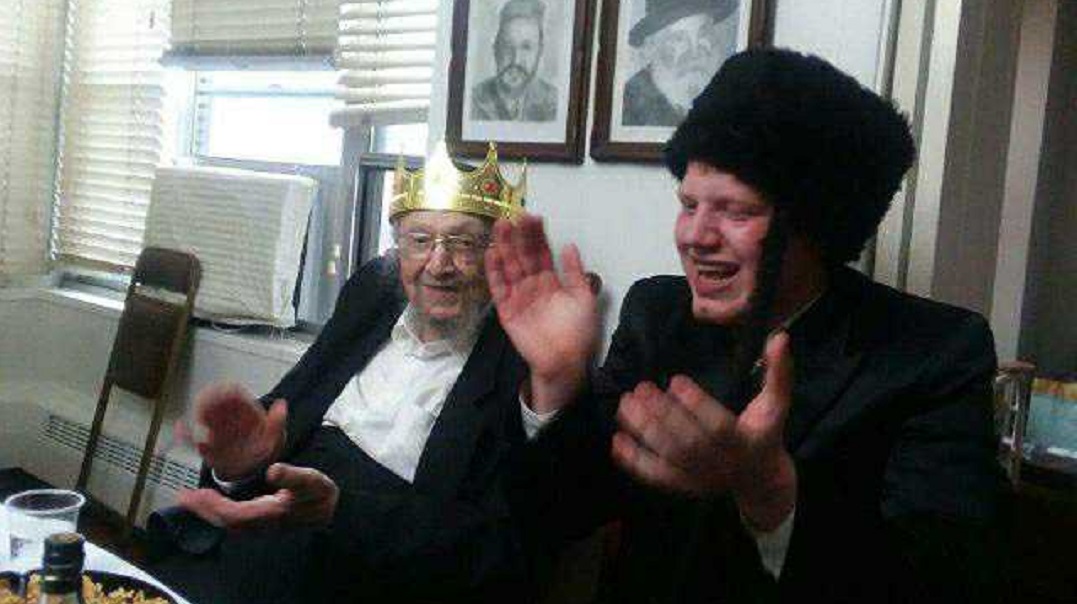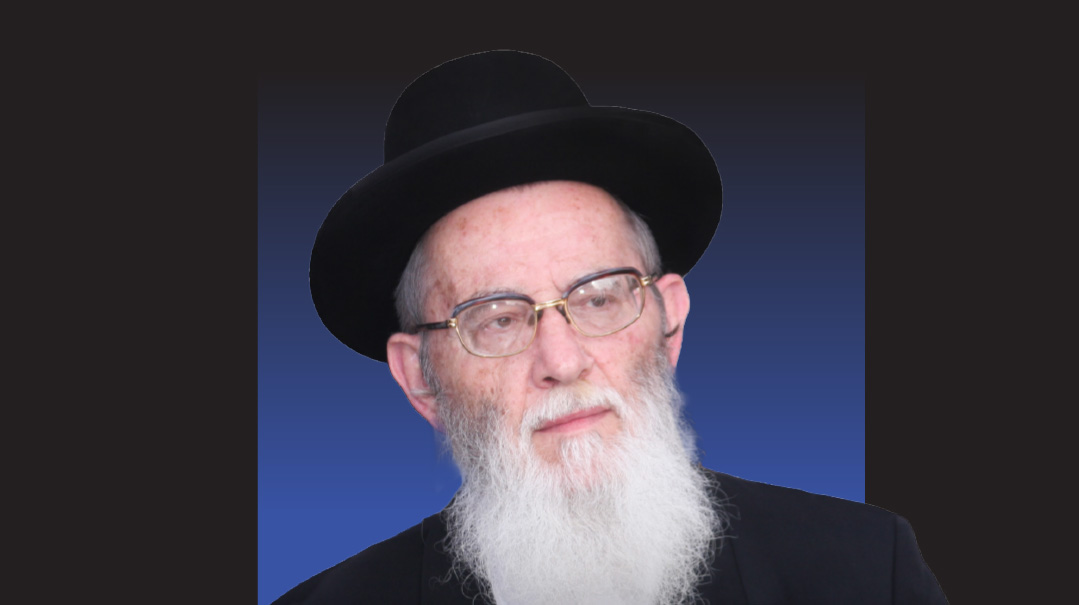My Rebbi, Rav Dovid Feinstein
| December 16, 2020Whenever I had an important decision to make, from naming my babies to making their weddings, I consulted with Rav Dovid

Rav Dovid Feinstein ztz’’l was niftar on Yud Tes Cheshvan. Although the loss of a gadol is a loss for the entire world, I felt the loss personally. Rav Dovid was my rebbi and was a part of my life for as long as I can remember. When I walk into the MTJ beis medrash now, where he was rosh yeshivah, and see his empty desk, I think I’m dreaming. How could Rebbi’s desk be sitting empty? It feels like he must be coming back soon. He was always at his desk learning
Rabbi Chaim Finkelstein
Rav Dovid was the sandek at my bris, and the mesader kiddushin at my wedding. I learned in his yeshivah, MTJ, for my entire life. I started out there in kindergarten, went there for elementary school, and stayed through high school as well. I spent many years in Rav Dovid’s shiur, and I am still in MTJ as the second grade rebbi. For just about my entire life, whenever I had an important decision to make, from naming my babies to making their weddings, I consulted with Rav Dovid.
Let me tell you a few things about him.
Rav Dovid was born in Russia. His father, Rav Moshe Feinstein, was a rav there. The Communist Russian government hated rabbis, and eventually Rav Moshe had to leave Russia. When Rav Dovid was seven years old, his family came to America. They settled on the Lower East Side, where Rav Moshe became the rosh yeshivah of Mesivta Tifereth Jerusalem.
Even when he was a young man, Rav Dovid was known to be an expert on the entire Shas. His rebbi was his father. They were very close and learned together all the time. Rav Moshe quotes his son Rav Dovid in many of his seforim. When Rav Moshe died in 1986, Rav Dovid became the rosh yeshivah of MTJ in his place.
Rav Dovid was always very humble
Before he became rosh yeshivah, his seat was in the back of the MTJ beis medrash, where he davened behind a wooden beam. He was already known to be an outstanding talmid chacham and he was the oldest son of the rosh yeshivah, but he never thought about sitting anywhere more prominent. He would even take care of the yeshivah’s soda machine, ordering the soda cans and filling the machine himself. The soda machine raised money for Torah learning, and rebbi wanted to take care of it.
Even after he became rosh yeshivah, Rav Dovid did not feel like he had to act or dress differently than anybody else. He was forced to move his seat to the front of the beis medrash, but that was all that seemed to change. He still wore the same plain black suit and hat, and he still took care of the soda machine. It wasn’t until years later that people finally convinced him to give the job to someone else.
As the years passed, Rav Dovid’s name became more and more famous, but it didn’t stop him from doing his own grocery shopping. We who lived on the Lower East Side would get a warm smile and a nod from him as we met him in the supermarket.
When I got married, I had some sh’eilos as to where to put the mezuzos in my new apartment.
“What’s your address?” the Rosh Yeshivah asked. “I’ll come to you later and check it out.”
Sure enough, that evening, my wife and I were thrilled to get a special visitor. Rav Dovid had walked over from his apartment by himself. He walked around my apartment and showed us exactly where a mezuzah would be needed. Who would expect a rosh yeshivah to make house calls?
He loved the Torah very much
Whether it was before Shacharis or after Maariv, any time I walked into the beis medrash I would find my rebbi sitting over his Gemara, writing his Torah thoughts in a notebook. After he died, his sons found piles of hundreds of notebooks filled with his Torah thoughts.
Three years ago, on the night before our daughter’s wedding, my wife and I took our daughter to visit the Rosh Yeshivah. When we got there, the Rebbetzin sent us into the Rosh Yeshivah’s office. Walking into the office, we were not surprised to find Rav Dovid sitting and learning. He was so busy learning that he did not notice three people walk into the room.
Even when we sat down in the chairs in front of his desk, he still did not notice us. We sat in those chairs for quite a few minutes, before Rebbi actually noticed we were there.
On Simchas Torah, MTJ was the place to go. The hakafos went until midnight. For the first few hakafos, the beis medrash wasn’t very crowded, but as the other shuls in the neighborhood finished, everyone would crowd into MTJ It was worth it. In the center of the circle, dancing with all his might, was always the Rosh Yeshivah. He refused to sit down when the Sifrei Torah were out. As he got older, it was hard for him to stand so long. The solution was that when he got tired, he would sit in the middle of the circle, holding a sefer Torah, as everyone danced around him. His face was always aglow with pure simchah.
He was a man of action
It was my first year of beis medrash. At the end of a day’s learning I walked to the back of the MTJ beis medrash to grab my coat and tefillin before I went home.
Uh oh. My coat was there, but my tefillin were gone. After thoroughly searching the whole beis medrash, I came to the conclusion that someone had taken my tefillin. The next day, after shiur, I told my rebbi about my lost tefillin, and I added that I was not giving up hope of finding them. He was horrified.
“No,” he said, “the halachah is you must give up hope. You must make your lost tefillin hefker, ownerless. It is possible that someone stole your tefillin and sold them to a Jew. If you aren’t mafkir your tefillin, a Jew might be wearing your tefillin thinking he is doing a mitzvah, but really be doing the aveirah of using stolen tefillin.”
“Okay,” I said, “I am mafkir them.”
Later, right before Minchah, the Rosh Yeshivah came over to me.
“I went to Rabbi Eisenbach’s store. He is a sofer. I ordered you a new pair of tefillin. I already picked out the parshiyos for the tefillin for you. Please ask your father to speak to Rabbi Eisenbach tomorrow.”
His talmid needed new tefillin, so Rav Dovid had immediately gone to the sofer to order him new ones.
A year ago, Rav Dovid was already 90 years old. He was not finding it easy to walk. I loved watching how once a month, when it was time to pay the members of the kollel, the Rosh Yeshivah would pull a pile of checks out of his jacket pocket and then walk around the beis medrash, from person to person, giving out those checks. The walking was hard for him, and he could have easily asked someone else to do the job, but the Rosh Yeshivah would not give up his mitzvah for anything.
His brachos were special
Five years ago, I brought my daughter to Rav Dovid for a brachah to find her shidduch. The brachah he gave was unusual.
“You should become a kallah before Rosh Hashanah,” he said.
A few months later, Rosh Hashanah came and went, yet my daughter did not become a kallah.
Exactly one year later, on the morning of Erev Rosh Hashanah, my daughter did become a kallah. Exactly like the Rosh Yeshivah had said: “before Rosh Hashanah.”
“Boys,” I announced to my second graders, “since you have been learning so well, we are going on an exciting ‘end-of-the-year trip.’ ”
“Where are we going?” the boys asked excitedly.
“We, along with the third and fourth grades, will be going for a boat ride around Manhattan.”
The boys were thrilled.
For the next two weeks the excitement mounted.
But one of the kindergarten morahs overheard the boys talking about the trip and grew concerned. “Do you really think it’s a good idea to take a bunch of yeshivah boys on a Manhattan boat ride, in the middle of June?”
“Why not?” I asked.
“Well,” she continued, “I’m just concerned about the lack of tzniyus you might find there.”
Suddenly, I felt sick.
She was right.
Certainly, on a hot June day, on a boat, there would be a tremendous lack of tzniyus. How could we bring our precious talmidim to a place where they would be exposed to such things?
I thanked the morah and ran to speak to the other rebbeim. We all agreed that the morah had a good point.
Maybe we would have to scrap our boat trip plans.
The assistant menahel volunteered to speak to the Rosh Yeshivah about the problem. “What should we do?” he asked. “Should we cancel the trip?”
The Rosh Yeshivah looked up at him. “Don’t worry about it,” he said. “You won’t have any problem.”
The next day, an excited group of boys boarded the boat. They couldn’t stop chattering about what our trip would be like. As we stepped onto the boat, the rebbeim nervously scanned the deck to see who our shipmates would be.
Boy, were we surprised. We were sharing our boat with a girls’ school. A Muslim girls’ school. Each teacher and student was covered from head to toe in the traditional Muslim dress. The only part of them that was visible was their eyes. We could not have asked for more tzniyusdig shipmates. Once again, the Rosh Yeshivah’s words had come true.
The world misses Rav Dovid Feinstein very much. We hope that Mashiach will come soon, and we will once again be able to learn Torah from him.
Yehi zichro baruch.
(Originally featured in Mishpacha Jr., Issue 840)
Oops! We could not locate your form.













